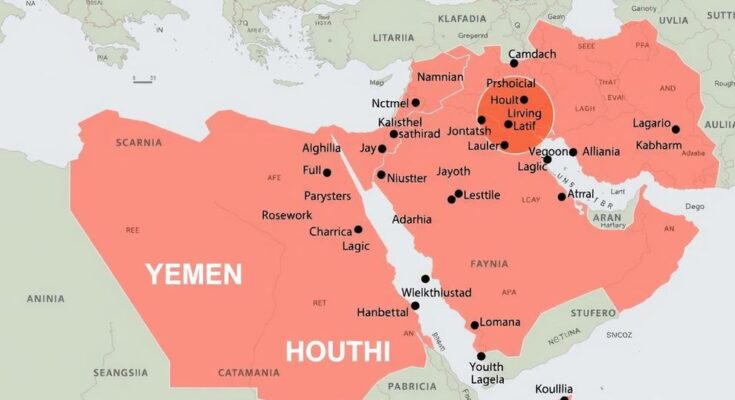Recent missile attacks from Yemen, attributed to the Houthis, have escalated tensions with Israel, injuring civilians and threatening international maritime operations. The Houthis, who control Yemen, are unique among Iranian proxies as they govern rather than merely representing insurgent forces. Understanding the Houthis as a state rather than just a militant group could influence international responses and regional stability efforts.
On the morning of a recent Saturday, a ballistic missile launched from Yemen struck a residential area in Jaffa, injuring 16 civilians, encompassing both Jewish and Arab individuals. Fortunately, the missile narrowly avoided a more catastrophic outcome, highlighting the precarious situation escalating from Yemeni hostilities to Israeli territories. Shortly before this attack, another missile from Yemen caused partial destruction to a school in Ramat Gan, although no casualties were reported. Despite timely retaliatory strikes by Israel and its allies targeting critical infrastructure in Yemen, the threat remains significant, exacerbated by the ongoing involvement of the Ansar Allah organization, commonly referred to as the Houthis. The Houthis maintain a troubling slogan laden with antisemitic rhetoric: “Allahu Akbar, death to America, death to Israel, curse on the Jews, victory for Islam.” This reflects their ideological foundation and reinforces their commitment to aggression against Israel.
Since the onset of the latest Israel-Hamas conflict, the Houthis have reportedly engaged in over 130 attacks on vital shipping lanes in the Red Sea, escalating tensions in an already volatile region. Unlike Iranian-supported militias in Iraq and Lebanon, the Houthis embody a different reality; they operate as the governing body of Yemen rather than as mere insurgent groups. In essence, they have supplanted the Yemeni state, controlling the capital, Sanaa, and enforcing their governance over significant territories, including the strategic port city of Hodeidah. This stark contrast positions the Houthis not as a fringe organization but as a de facto state actively engaging in hostilities against other nations.
Compounding the complexity of the Yemeni situation is the existence of a competing government located in southern Yemen, which, despite lacking control over the capital or military forces, retains international legitimacy. Historical instances, such as international recognition of the Taliban or the UN’s stance on China in 1971, illustrate that geopolitical recognition can evolve unexpectedly. Israel might benefit from arguing that the Houthis should not merely be viewed through the lens of terrorism but as a rogue state posing significant risks to regional stability and global economic channels. This reframing could challenge the established narrative of Iran’s proxy strategy and provoke a reevaluation of the legal implications surrounding the Houthis’ actions in international arenas.
The discussions surrounding deterrence against the Houthis need an epistemological shift, wherein they are perceived not solely as a dilapidated entity engaged in sporadic attacks but as a proclaimed state declaring war on Israel without provocation. Such a perspective could facilitate a more viable approach to addressing the challenges posed by the Houthis through suitable international dialogues and channels.
The article examines the recent escalation of hostilities involving the Houthi movement in Yemen, particularly focusing on their missile attacks into Israeli territories. It explains the unique status of the Houthis, differentiating them from other Iranian proxies by highlighting their control over Yemen. The context of their attacks and the implications for international relations are discussed, illustrating how the Houthis operate as a governing body rather than a mere militant group. This distinction is crucial for understanding the regional stability issues stemming from their actions.
In conclusion, the transformation of the Houthis from a radical group to a recognized entity representing Yemen presents significant challenges for regional and international security dynamics. Acknowledging the Houthis as a state can reshape diplomatic discourse, fostering an environment conducive to addressing the threats they pose. Thus, Israel and the international community must reconsider their broader strategies in dealing with the Houthis, framing them as a rogue state that endangers not just regional but also global stability.
Original Source: www.jpost.com




